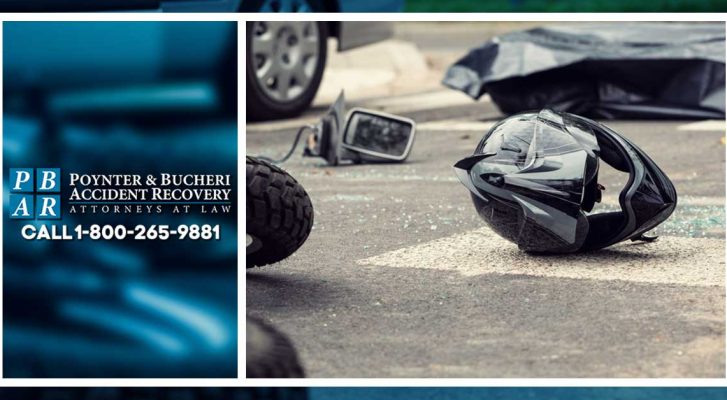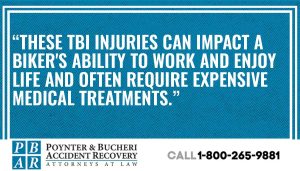
Motorcycle Accident Head Injury: What You Should Consider


Every year, thousands of motorcyclists suffer from injuries in Indiana, many of whom sustain serious head injuries. While motorcycles are fun and thrilling, they don’t offer the same bodily protection as standard passenger vehicles. Even a minor collision can cause a biker to suffer from a motorcycle accident head injury.
These TBI injuries can impact a biker’s ability to work and enjoy life and often require expensive medical treatments. Fortunately, you have the right to file a claim against a driver who caused your suffering, including traumatic brain injuries.
Here’s what you need to know about motorcycle accident head injuries, including TBI symptoms, treatments, and recovering compensation.
Suffering a Head Injury After a Bike Accident
Concussions are the most common type of traumatic brain injury and are also the mildest. Other types of traumatic brain injuries include:
- Contusions
- Brain hemorrhages
- Intracranial hematomas
- Coup-contrecoup brain injury
- Diffuse axonal injury
- Penetrating brain injury
Bikers can protect themselves from these injuries by wearing helmets approved by the Department of Transportation (DOT). While this safety measure is important for your protection, Indiana doesn’t require you to wear a helmet as long as you’re over 18 and have a valid motorcycle license.
According to the National Highway Traffic Safety Administration (NHTSA), wearing a helmet greatly reduces your chances of suffering a traumatic brain injury, but it doesn’t eliminate the possibility. The NHTSA’s crash statistics indicated that around 15% of helmeted motorcyclists who were hospitalized suffered from TBIs, as opposed to 21% of unhelmeted bikers.
Symptoms of TBI Injuries
Traumatic brain injuries can display a wide range of symptoms that vary in significance depending on the severity of your condition. If you were involved in a motorcycle accident, you need to be on the lookout for these symptoms, many of which will be hard to ignore:
- Headaches or migraines
- Dizziness or loss of balance
- Nausea or vomiting
- Sensitivity to light
- Blurred vision
- Ringing in the ears
- Fatigue or sleep disturbances
- Seizures or convulsions
- Memory problems
- Difficulty concentrating
- Confusion
- Difficulty with making decisions or problem-solving
- Speech difficulties
- Mood swings or emotional instability
- Anxiety
- Depression
- Social withdrawal
- Impulsive behavior
- Loss of taste or smell
- Changes in hearing or sensitivity to sound
- Slurred speech or difficulty articulating words
- Trouble understanding or following conversations
If you’re struggling with these symptoms after a crash, you need to seek medical attention immediately.
Receiving Medical Treatment After a Motorcycle Accident Head Injury
Receiving timely medical treatment after suffering from a head injury is critical for your recovery. When you visit your primary care doctor or a neurologist, they will diagnose the extent of your head injury through a CT scan or an MRI.
Depending on the severity of your head injury and symptoms, they may prescribe various medications to mitigate further damage to your brain. For example, many of those suffering from TBI injuries develop frequent seizures, which may potentially harm the brain further. Doctors sometimes prescribe anti-seizure medications to treat this symptom.
While a concussion will likely not require surgery, more severe head injuries may require surgical intervention.
Some types of surgical treatments for head injuries include:
- Craniotomy: Removal of a portion of the skull to treat significant blood clots.
- Cranioplasty: Reconstructive surgery of the skull. Surgeons sometimes perform cranioplasty after a patient undergoes a craniotomy.
- Endoscopic Ventriculostomy: Procedure that drains cerebrospinal fluid in the brain.
- Burr Hole Surgery: A common procedure that involves creating small holes in the skull to drain subdural hematomas.
Get Just Compensation for Your Head Injury
If you’ve sustained a TBI or another injury from a motorcycle accident, you need to file a claim against the responsible party to recover compensation. This is especially important because head injuries often require incredibly expensive treatments.
To recover money from a negligent driver or another party, you’ll need to have clear evidence indicating that they were at fault for the crash.
Types of evidence you can use include:
- A police accident report
- Eyewitness testimony
- Photos and videos of the accident and its aftermath
- Accident reconstruction expert testimony
You’ll also need to supply evidence indicating that you suffered losses as a direct result of the accident. Depending on your case, you may be able to recover damages for medical bills, property damage, lost wages, pain and suffering, and loss of future earnings.
Forms of evidence you can use to prove that you suffered losses include:
- Medical records
- Medical bills and related expenses
- Documentation indicating that you took time away from work due to your injuries
- Expert medical opinions
- Vehicle damage estimates
- Testimony from mental health professionals
- Testimony from family, friends, and co-workers corroborating that your injuries have impacted your quality of life
Contact an Indianapolis Traumatic Brain Injury Attorney Today
You are not required to have legal representation when filing a claim, but enlisting the services of a motorcycle accident attorney can greatly improve your chances of recovering full compensation. For expert traumatic brain injury lawyers in Indianapolis, contact Poynter & Bucheri Accident Recovery Attorneys at Law. Call us today at 1-800-265-9881 or schedule a free case review online here.
